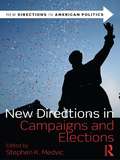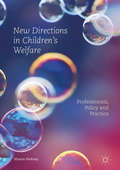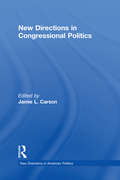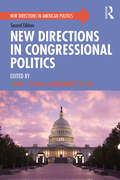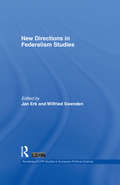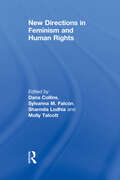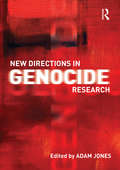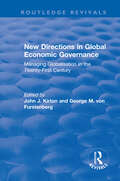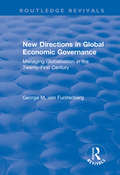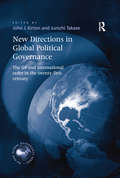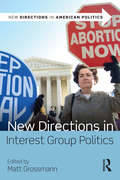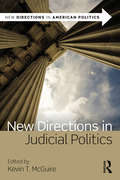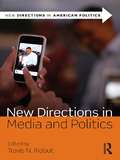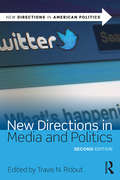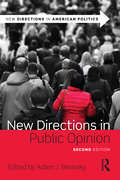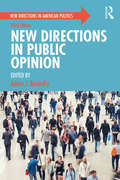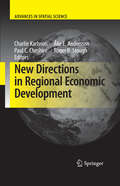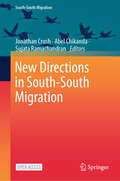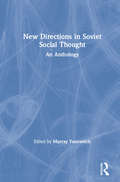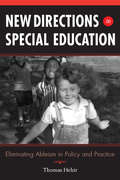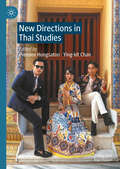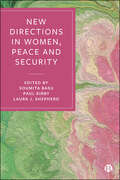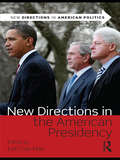- Table View
- List View
New Directions in Campaigns and Elections
by Stephen K. MedvicThe ground upon which campaigns and elections are contested has been shifting rapidly in the last decade. Radical and ongoing changes to the way elections are administered and campaigns are financed; new approaches to polling, campaign management and advertising, and voter mobilization; and recent developments in the organization of political parties and interest groups, the operation of the media, and the behavior of voters require close examination. New Directions in Campaigns and Elections guides students through the tangle of recent developments in real-world politics drawing on the insights of innovative scholarship on these topics. More than any other aspects of American politics, campaigns and elections have been affected—in many cases transformed—by new communication technologies, a recurring theme throughout the volume. This tightly organized collection of original contributions raises important normative questions, grounds students’ thinking in cutting edge empirical research, and balances applied politics with scholarly insights. Like other volumes in the New Directions in American Politics series, the focused exploration of the latest developments across a comprehensive range of topics makes this an ideal companion for students eager to understand the rapidly changing political environment of the U.S. electoral process.
New Directions in Children’s Welfare
by Sharon PinkneyThis book makes a distinctive contribution to reflections on what child-centred practice means in the complex area of child welfare. With a theoretical framework informed by insights from a number of disciplinary perspectives, the author pays particular attention to psychosocial, emotional, sensory and spatial influences. The book applies its ideas to case studies, in order to reflect on the contemporary landscape of children's services within the UK. The book sets out the way policy and law establish a complex terrain for contemporary child welfare practice. At a time when the government demands clear answers to perceived child protection failings, Pinkney carefully reflects upon the complexity involved in protecting children. This timely re-examination of child welfare will appeal to social work and children's services professionals; policy makers; as well as students and scholars of social work, childhood studies and social policy.
New Directions in Congressional Politics
by Jamie L. CarsonAs the U.S. Congress has steadily evolved, so too has our understanding of the institution. New Directions in Congressional Politics offers an accessible overview of the current developments in our understanding of America’s legislative branch. Jamie L. Carson helps students bridge the gap between roles, rules, and outcomes by focusing on four themes woven throughout: the importance of electoral considerations, legislators’ strategic behavior to accomplish objectives, the unique challenges of Congress as a bicameral institution, and the often-overlooked policy outputs of the institution. This book brings together leading scholars of Congress to provide a general overview of the entire field. Each chapter covers the cutting edge developments on its respective topic. As the political institution responsible for enacting laws, the American public regularly looks to the U.S. Congress to address the important issues of the day. The contributors in this volume help explain why staying atop the research trends help us better understand these issues.
New Directions in Congressional Politics (New Directions in American Politics)
by Jamie L. Carson Michael S. LynchAs the U.S. Congress has steadily evolved since the Founding of our nation, so too has our understanding of the institution. The second edition of New Directions in Congressional Politics offers an accessible overview of the current developments in our understanding of America’s legislative branch. Jamie L. Carson and Michael S. Lynch help students bridge the gap between roles, rules, and outcomes by focusing on a variety of thematic issues: the importance of electoral considerations, legislators’ strategic behavior to accomplish objectives, the unique challenges of Congress as a bicameral institution in a polarized environment, and the often-overlooked policy outputs of the institution. This book brings together leading scholars of Congress to provide a general overview of the entire field. Each chapter covers the cutting-edge developments on its respective topic. As the political institution responsible for enacting laws, the American public regularly looks to the U.S. Congress to address the important issues of the day. The contributors in this volume help explain why staying atop the research trends helps us better understand these issues in the ever-changing field of American politics. New to the Second Edition New and updated chapters highlighting party recruitment, redistricting, women in Congress, the nationalization of Congressional elections, and the reassertion of Congressional oversight. A first look at Congressional-executive relations in the Trump era. Updated data through the 2018 Midterm elections.
New Directions in Federalism Studies (Routledge/ECPR Studies in European Political Science)
by Jan Erk Wilfried SwendenFederalism has experienced a remarkable renaissance in recent decades - as an alternative way to accommodate ethnic differences; as a tool to combat remote, undemocratic and ineffective central governments; and lastly, as a means to promote economic performance in the developing world through decentralisation. This book seeks to bring different aspects and perspectives of federalism studies closer together, by providing an analytical framework which transcends the sub-fields and encourages contributors to look beyond the comfort zones of their own disciplinary approaches to the topic. The authors seek to achieve this aim by structuring the contributions around four dimensions federalism studies: * the development and design of federal institutions; * federalism and democratic participation, representation and accountability; * federalism and the accommodation of territorially-based ethnic, cultural and linguistic differences; * federalism and public policy. With a strong comparative framework, New Directions in Federalism Studies will be of interest to students and scholars of Federalism, Government, Regionalism, and Multi-level Governance. It will also offer insights of relevance to Comparative Politics, Public Policy, Public Administration, Nationalism, and West European Politics.
New Directions in Feminism and Human Rights
by Dana Collins, Sylvanna M. Falcón, Sharmila Lodhia and Molly TalcottOn the sixtieth anniversary of the Universal Declaration of Human Rights, feminists are at a critical juncture to re-envision and re-engage in a politics of human rights. Interdisciplinary feminist conversations among scholar-activists can both challenge and enrich new directions in feminism and human rights. The scholarly and activist writings that comprise this collection advance both research and critical conversations about feminism and human rights by revealing the transformative potential of a feminist human rights praxis that embraces both critique and collective justice. The editors' method has been to move beyond a wholesale dismissal of human rights so that the book may begin new dialogues that envision transnational, gender and antiracist social justice approaches.This book features work that engages academic critiques of human rights frameworks yet goes further by exploring the potential of human rights activism ‘from below’. These groundbreaking chapters and conversations provide evidence of the persistent challenges and the attendant possibilities inherent in feminist human rights activism and theorizing – they offer this book, underscoring the creative displays of grassroots resistance by women globally and affirming transnational feminist solidarity.This book was published as a special issue of the International Feminist Journal of Politics.
New Directions in Genocide Research
by Adam JonesGenocide studies is a relatively new field of comparative inquiry, but recent years have seen an increasing range of themes and subject-matter being addressed that reflect a variety of features of the field and transformations within it. This edited book brings together established scholars with rising stars and seeks to capture the range of new approaches, theories, and case studies in the field. The book is divided into three broad sections: Section I focuses on broad theories of comparative genocide, covering a number of different perspectives. Section II critically reconsiders core themes of genocide studies and unfolds a range of challenging new directions, including cultural genocide, gender and genocide (as it pertains to both women and men), structural violence, and the novel application of remote-sensing technologies to the detection and study of genocide. Section III is case-study focused, seeking to place both canonical and little-known cases of genocide in broader comparative perspective. Cases analyzed include genocide in North America, the Nazi Holocaust, the Armenian genocide, and the Sri Lankan genocide. The combination of cutting-edge scholarship and innovative approaches to familiar subjects makes this essential reading for all students and scholars in the field of genocide studies.
New Directions in Global Economic Governance: Managing Globalisation in the Twenty-First Century (Routledge Revivals)
by George M. FurstenbergThis title was first published in 2001. Containing a wide array of intellectual perspectives, this illuminating text takes an authoritative look at the rules, decision-making procedures and organizational resources at the heart of the institutions of global governance and provides a much-needed Asian perspective on key issues, dealing with new questions raised at the Okinawa summit. Particularly suitable for graduate courses in political science, international political economy, international organizations, corporate strategy and international business, as well as having implications for the public policy community.
New Directions in Global Economic Governance: Managing Globalisation in the Twenty-First Century (The\g Eight And Global Governance)
by George M. FurstenbergThis title was first published in 2001. Containing a wide array of intellectual perspectives, this illuminating text takes an authoritative look at the rules, decision-making procedures and organizational resources at the heart of the institutions of global governance and provides a much-needed Asian perspective on key issues, dealing with new questions raised at the Okinawa summit. Particularly suitable for graduate courses in political science, international political economy, international organizations, corporate strategy and international business, as well as having implications for the public policy community.
New Directions in Global Political Governance: The G8 and International Order in the Twenty-First Century (The G8 and Global Governance Series)
by Junichi TakaseFocused on politics and security, this volume extends the G8 and Global Governance series into the domain of international security in both its classic and newer forms. Going beyond the conventional focus on globalization, it takes up the central question of shaping international order, looking at the emergence of several important phenomena including: - The advent of human security - The global importance of once deeply domestic security issues - Enhanced demands for civil society participation Sections on Japan's perspective on the G8 and international order, critical issues in global security governance and the role of international institutions and American leadership therein, make this a distinctive account of international security in the 21st century.
New Directions in Interest Group Politics (New Directions in American Politics)
by Matt GrossmannReflecting cutting edge scholarship but written for undergraduates, New Directions in Interest Group Politics will help students think critically about influence in the American political system. There is no shortage of fear about "the special interests" in American political debate, but reliable information about what interest groups do, who they represent, and how they influence government is often lacking. This volume, comprised of original essays by leading scholars, is designed to summarize and explain contemporary research that helps address popular questions and concerns, making studies accessible to undergraduate students and providing facts to butress informed debate. The book covers the mobilization of interest groups, their activities, and their influence. Each chapter briefly reviews research on a central question of scholarship before focusing on a particular empirical project designed to shed light on the topic. Rather than simply providing a descriptive overview, the chapters are designed to foster critical thinking by getting students to assess the role of interest groups in the American political system and supplying evidence of their effects. Importantly, a set of web resources associated with the book offer instructions for research and writing assignments. Students will be able to collect and analyze data on campaign finance, lobbying, and interest group involvement in governance. The eResource website includes materials for several classroom simulations, such as an interest group legislative battle, a Netroots convention, and a rule-making process. As they read about key questions in democratic government and current research trends, students can practice serving as interest group activists and conduct original research on topics that most interest them.
New Directions in Japan’s Security: Non-U.S. Centric Evolution (Nissan Institute/Routledge Japanese Studies)
by Paul Midford Wilhelm VosseWhile the US-Japan alliance has strengthened since the end of the Cold War, Japan has, almost unnoticed, been building security ties with other partners, in the process reducing the centrality of the US in Japan’s security. This book explains why this is happening. Japan pursued security isolationism during the Cold War, but the US was the exception. Japan hosted US bases and held joint military exercises even while shunning contacts with other militaries. Japan also made an exception to its weapons export ban to allow exports to the US. Yet, since the end of the Cold War, Japan’s security has undergone a quiet transformation, moving away from a singular focus on the US as its sole security partner. Tokyo has begun diversifying its security ties. This book traces and explains this diversification. The country has initiated security dialogues with Asian neighbors, assumed a leadership role in promoting regional multilateral security cooperation, and begun building bilateral security ties with a range of partners, from Australia and India to the European Union. Japan has even lifted its ban on weapons exports and co-development with non-US partners. This edited volume explores this trend of decreasing US centrality alongside the continued, and perhaps even growing, security (inter) dependence with the US. New Directions in Japan’s Security is an essential resource for scholars focused on Japan’s national security. It will also interest on a wider basis those wishing to understand why Japan is developing non-American directions in its security strategy.
New Directions in Judicial Politics (New Directions in American Politics)
by Kevin T. McGuireWith its often vague legal concepts and institutions that operate according to unfamiliar procedures, judicial decision-making is, in many respects, a highly enigmatic process. New Directions in Judicial Politics seeks to demystify the courts, offering readers the insights of empirical research to address questions that are of genuine interest to students. In addition to presenting a set of conclusions about the way in which courts operate, this book also models the craft of political research, illustrating how one can account for a variety of factors that might affect the courts and how they operate. The renowned scholars and teachers in this volume invite critical thinking, not only about the substance of law and courts in America, but also about the ways in which we study judicial politics.
New Directions in Media and Politics
by Travis N. RidoutThe field of media and politics is quickly changing as society transforms and new technologies develop continuously. Academic research in the area is rapidly breaking new ground to keep pace with the prolific media developments. This innovative, up-to-date text moves beyond rudimentary concepts and definitions to consider the exciting scholarly research that addresses the monumental recent changes in the media system of the United States and the world. This carefully crafted volume addresses the big questions that academic researchers are asking, exposing students to the rigorous scholarship in the field but making it readily understandable by undergraduate students. Each chapter starts with a "big question" about the impact of the news media, provides an overview of the more general topic, and then answers that question by appealing to the best, most-up-to-date research in the field. The volume as a whole is held together by an exploration of the rapidly changing media environment and the influence these changes have on individual political behavior and governments as a whole. New Directions in Media and Politics will make an ideal book for courses as it digs deeper into the questions that standard textbooks only hint at—and presents scholarly evidence to support the arguments made.
New Directions in Media and Politics (New Directions in American Politics)
by Travis N. RidoutIt would be difficult to find a more interesting topic than the relationship between the news media and politics, especially given that Americans are now living in the "Twitter presidency" of Donald Trump. Academic research in the area of media and politics is rapidly breaking new ground to keep pace with prolific media developments and societal changes. This innovative, up-to-date text moves beyond rudimentary concepts and definitions to consider exciting research as well as practical applications that address monumental changes in media systems in the US and the world. This carefully crafted volume explores key questions posed by academics and practitioners alike, exposing students to rigorous scholarship as well as everyday challenges confronted by politicians, journalists, and media consumers. Each chapter opens with a "big question" about the impact of the news media, provides an overview of the more general topic, and then answers that question by appealing to the best, most-up-to-date research in the field. The volume as a whole is held together by an exploration of the rapidly changing media environment and the influence these changes have on individual political behavior and governments as a whole. New Directions in Media and Politics makes an ideal anchor for courses as it digs deeper into the questions that standard textbooks only hint at—and presents scholarly evidence to support the arguments made. New to the Second Edition Fully updated through the 2016 elections and the early Trump presidency with a special focus on the role of social media. Adds three new chapters: The Move to Mobile; Media and Public Policy; and Fake News. Adds Discussion Questions to the end of each chapter.
New Directions in Public Opinion (New Directions in American Politics)
by Adam J. BerinskyThe field of public opinion is one of the most diverse in political science. Over the last 60 years, scholars have drawn upon the disciplines of psychology, economics, sociology, and even biology to learn how ordinary people come to understand the complicated business of politics. But much of the path-breaking research in the field of public opinion is published in journals, taking up fairly narrow questions one at a time and often requiring advanced statistical knowledge to understand these findings. As a result, the study of public opinion can seem confusing and incoherent to undergraduates. To engage undergraduate students in this area, a new type of textbook is required. The second edition of New Directions in Public Opinion brings together leading scholars to provide an accessible and coherent overview of the current state of the field of public opinion. Each chapter provides a general overview of topics that are at the cutting edge of study as well as well-established cornerstones of the field. Each contributor has made substantive revisions to their chapters, and three chapters have been added on genetics and biology, immigration, and political extremism and the Tea Party. Suitable for use as a main textbook or in tandem with a lengthier survey, this book comprehensively covers the topics of public opinion research and pushes students further to explore critical topics in contemporary politics.
New Directions in Public Opinion (New Directions in American Politics)
by Adam J. BerinskyThe 2016 elections called into question the accuracy of public opinion polling while tapping into new streams of public opinion more widely. The third edition of this well-established text addresses these questions and adds new perspectives to its authoritative line-up. The hallmark of this book is making cutting-edge research accessible and understandable to students and general readers. Here we see a variety of disciplinary approaches to public opinion reflected including psychology, economics, sociology, and biology in addition to political science. An emphasis on race, gender, and new media puts the elections of 2016 into context and prepares students to look ahead to 2020 and beyond. New to the third edition: • Includes 2016 election results and their implications for public opinion polling going forward. • Three new chapters have been added on racializing politics, worldview politics, and the modern information environment. • New authors include Shanto Iyengar, Michael Tesler, Vladimir E. Medenica, Erin Cikanek, Danna Young, Jennifer Jerit, and Jake Haselswerdt.
New Directions in Regional Economic Development
by Charlie Karlsson Paul C. Cheshire Ake E. Andersson Roger R. StoughThe emphasis of this book lies on emerging hypotheses, new methods and theoretic developments in the field of regional economic development. A further amplification is provided with a diverse set of cases extending this new way of thinking at the theory and methods level into policy and practice. The case studies range from a focus on Europe, Central and East Asia and North America. Considerable emphasis is laid on the role of entrepreneurship and innovation as drivers of economic growth and development on the sub-national regional level.
New Directions in South-South Migration (International Perspectives on Migration)
by Jonathan Crush Abel Chikanda Sujata RamachandranThis open access book offers a comprehensive understanding of South-South migration. It explores crucial migration themes such as migrant integration in urban areas, migration and rural transformation, urban migration policy environment, migration corridors, and migrant precarity and survival, especially food security. It features contributions from eminent scholars in the Global South, namely, Africa, Asia, Latin America & Caribbean and the Middle East. Chapters in the book present theoretical perspectives and practical case studies building on the results of detailed surveys, in-depth interviews, field observations and other materials. The book highlights new findings and research outputs from recent and ongoing collaborative projects between multiple researchers from the Global South and North. The book is intended for researchers, graduate students and teachers of geography, social policy, refugees and migration studies, history, international development and urban studies. This is an open access book.
New Directions in Soviet Social Thought: An Anthology
by Murray Yanowitch A. Schultz M. ValeThe essays in this volume illustrate the kind of expansionary logic that has characterized Soviet reformist thinking in the social sciences in the 1980s. The themes discussed show the wide-ranging and multidisciplinary nature of reformist currents in the Soviet Union.
New Directions in Special Education: Eliminating Ableism in Policy and Practice
by Thomas HehirA comprehensive study that is also practical and realistic, New Directions in Special Education outlines principles for decisionmaking about special education at every level—from the family to the classroom, school, and district—and for state and federal policy. With this volume, leading scholar and disability advocate Thomas Hehir opens a new round of debate on the future of special education. Extending the conceptual framework developed in his seminal 2002 article in the Harvard Educational Review, "Eliminating Ableism in Education," Hehir examines the ways that cultural attitudes about disability systematically distort the education of children with special needs and uses this analysis to lay out a fresh approach to special education policy and practice. Hehir traces the roots of "ableism"—the pervasive devaluation of people with disabilities—and shows how negative attitudes continue to shape debates in the field. He assesses recent trends in special education policy, particularly the shift of emphasis from compliance to outcomes, and discusses in depth the successes and limitations of the inclusion movement. He also investigates the impact of standards-based reforms on children with disabilities and critically examines the promise of Universal Design for Learning.
New Directions in Thai Studies
by Ying-Kit Chan Preedee HongsatonThis book considers recent developments in Thai history and historiography, examining why Thai studies had suffered under a combination of protectionism, uncritical learning, and unwillingness to engage with scholarship from abroad. The essays collected here explore, from Thai perspectives, innovations in theory and methodology in Thai studies, gathering critical insights from disciplines such as anthropology and cultural studies. The book may also serve as an entry to Thai studies, informing experts and non-specialist readers alike on topics such as access to Thai archives, the difficulties in conducting ethnographic research with Thai subjects, the (non-)development of scholarly disciplines in Thailand, and the challenges and opportunities presented by Thai studies as a whole for prospective scholars and graduate students.
New Directions in Urban Public Housing
by David P. Varady Francis P. Russell Wolfgang F. E. PreiserPublic housing is at a crossroads, buffeted by demographic, economic, and political winds. Privatization, rehabilitation, demolition, rent certificates and vouchers, tenant management, tenant ownership, resident empowerment: these are just some of the current and proposed policy initiatives that could change the face of urban public housing.In this book the nation's foremost housing policy experts explore the problems and identify solutions that will define the future of this essential housing sector. The contributors review the origins of public housing policy, probe the current policy climate, and anticipate new directions. Chapters are illustrated with case studies from Boston, Chicago, Decatur, Indianapolis, San Francisco, and Seattle, as well as the United Kingdom.The book contains sections addressing: historical perspectives, social issues, design issues, comprehensive approaches to public housing revitalization, and future directions. The contributors include: Alexander von Hoffman, Peter Marcuse, William Petersen, Leonard F. Heumann, Karen A. Franck, David M. Schnee, Gayle Epp, Lawrence J. Vale, Richard Best, Mary K. Nenno, Irving Welfeld, and James G. Stockard, Jr. This book should be read by all city planners, housing officials, and government personnel.
New Directions in Women, Peace and Security
by Soumita Basu, Paul Kirby and Laura J. ShepherdWhat does gender equality mean for peace, justice, and security? At the turn of the 21st century, feminist advocates persuaded the United Nations Security Council to adopt a resolution that drew attention to this question at the highest levels of international policy deliberations. Today the Women, Peace and Security agenda is a complex field, relevant to every conceivable dimension of war and peace. This groundbreaking book engages vexed and vexing questions about the future of the agenda, from the legacies of coloniality to the prospects of international law, and from the implications of the global arms trade to the impact of climate change. It balances analysis of emerging trends with specially commissioned reflections from those at the forefront of policy and practice.
New Directions in the American Presidency
by Lori Cox HanThe study of the American presidency, both as a political institution and the men who have held the office, is one of the most fascinating and dynamic fields of study within American government. New Directions in the American Presidency takes a current look at the various issues facing the presidency and provides a "state of the art" overview of current trends in the field of presidency research. This edited volume covers all of the standard topics necessary for use in an undergraduate-level presidency course or a graduate-level seminar while also bringing together key disciplinary debates and treatment of important current real-world developments. Each chapter is written with students in mind so that it remains accessible, interesting, and engaging and does not inundate readers with pedantic or jargonistic terms. This will undoubtedly become a key resource to engage students in the exciting debates over scholarship on presidential politics.
